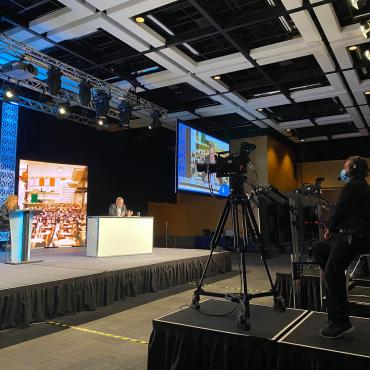Experiential marketing: a growth experience for event planners

Over the past few years, the event industry has seen a slow, yet seismic, shift from the homogenizing of conferences and conventions to creating experiential events that spark engagement and long-lasting impact on attendees.
And Lara McCulloch has been driving this transformation for over 10 years. She is the Chief Shift Disturber at laramcculloch.com and a 20-year brand strategist veteran for Fortune 500 companies and entrepreneurs. Lately, she has been helping planners with their events’ brand positioning.
Event planners’ marketing challenges

“Today’s event attendees are bombarded with an onslaught of events and opportunities to fine-tune their know-how and exchange with peers,” Ms. McCulloch explained.
“Faced with an increasing participant ‘blindness’ towards promotional initiatives that try to attract them to a conference or convention, event organizers have had to rethink each event’s brand positioning and marketing initiatives to rise out of the noise.”

Trisha Stezzi, Founder and CEO of SIGNIFICANCE, a branding agency that believes in purpose-driven and cause marketing, agrees. “You cannot effectively market an event towards potential attendees based on the program or the speakers alone—especially not in this day and age,” Ms. Stezzi said.
“You have to get back to the core and ask yourself: ‘Apart from catering to the learning and networking needs of a specialized field, market sector or association, what value will attendees get out of a convention or conference. What is the event’s WHY?”
The reason? “Engaging with attendees means connecting with them in deeper ways and infusing real purpose in what they do. The concept of purpose will take on a greater role in event planning than ever before. After all, event participants are no longer passive ticket buyers. They want to express their knowledge and experience through meaningful business relationships and with peers for the common good.”
Furthermore, as Ms. McCulloch pointed out, event attendees are being greatly influenced by on-demand experiences in other aspects of their lives, such as streaming services. “They create heightened expectations for immersive experiences and custom-tailored content.”
Add social media to the foray. “Social media is a double-edge sword when it comes to events,” Ms. McCulloch added. “On the one hand, it has enabled event planners to market events across broader audiences, whether by organic posts or advertising. On the other hand, because people share their experiences on social media, the lifespans of unique ideas is miniscule. We’re seeing an upsurge of competition for…ideas. And unfortunately, events contribute to the noise as opposed to breaking away from it.”
Experiential event basics
According to both Ms. McCulloch and Ms. Stezzi, it all starts by defining the psychographic profiles of event attendees. These will enable event organizers to understand what Ms. McCulloch calls ‘micro-niches,” or a more in-depth understanding of attendee personas that a generalized persona-brainstorming session may afford.
The types of questions to ask when determining these micro-niches? Think of the internal and external drivers that incite them to take action or change. What type of connection or paradigm shift do you want to create at the event? “It’s all about relevant and positive disruption by finding micro-niches and catering to what makes them tick,” Ms. Stezzi said.
Ms. McCulloch concurred. “Find the friction points for event attendees—those that they experience in their personal lives—that may be the springboards for them to consider an event,” she said. “Research extensively to learn about opportunities in the market sector’s space that are currently not being detected by other events. The biggest mistake is looking at what the industry is doing and copying that. Never recycle what’s being done in an industry’s other events.”
The next step? It’s all about crafting the story that will create a multi-dimensional experience that evokes memories, feelings and ignites new ideas. “Event storytelling bonds event attendees with the topic matter by starting a conversation—not just a ‘transaction,’ said Ms. Stezzi. “With a program schedule and content based on attendees pain points and values, planners can tailor the narrative and offer event experiences that generate long-lasting impact.” In other words, make sure you avoid death by PowerPoint and other such cookie-cutter event initiatives.
Research extensively to learn about opportunities in the market sector’s space that are currently not being detected by other events. The biggest mistake is looking at what the industry is doing and copying that. Never recycle what’s being done in an industry’s other events.
Once you have an over-arching storyline, now is the time to map out the attendee journey, along with the key moments during your event that will further develop your story. “All touchpoints throughout the attendee journey will contribute to participants’ overall feelings about the event—and make them actually care about and envision a future state,” said Ms. McCulloch.
As for the micro-experiences themselves, both Ms. McCulloch and Ms. Stezzi indicate that planners should innovate by turning to what is being done in other industries. Just because organizers are planning an event for a technical association or scientific society doesn’t mean they can’t capture compelling cues from B2C events. “Naturally, any experiential marketing tactic needs to be on par with the event itself and participant profiles,” Ms. Stezzi said. “Nevertheless, a breath of fresh air never hurt to galvanize attendees to seeing the role they play in their market sector in a whole new light.”
“Experiential event marketing need not be rocket science,” concluded Ms. McCulloch. “It takes a forward-thinking mindset that fosters interactivity between participants, speakers and exhibitors. It encourages crowdsourcing content that really resonates with attendees. And it is achieved through authentic, emotional attachments that involve—and not just entertain—event attendees.







